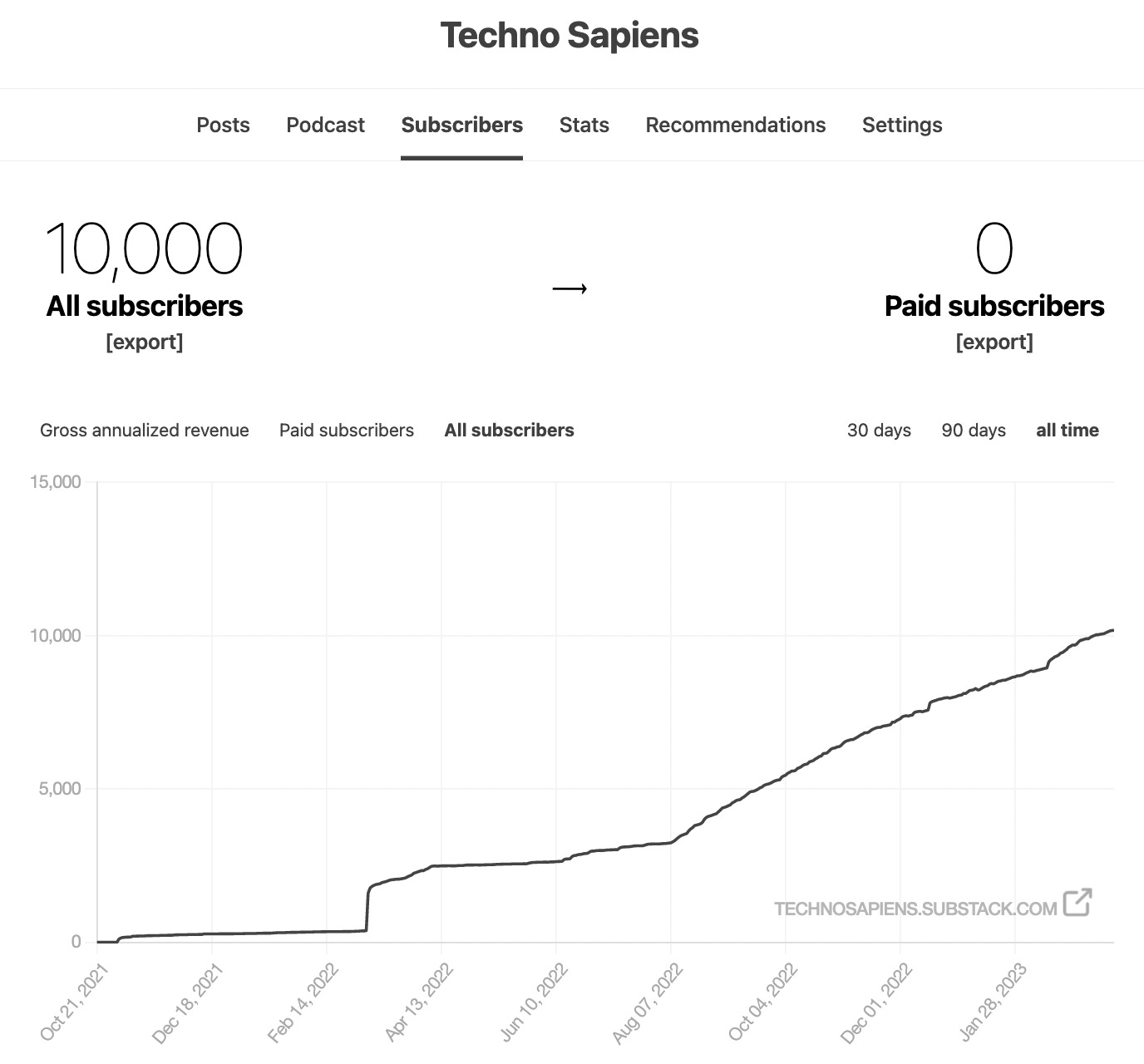Hi there! A few weeks ago, our Techno Sapiens community passed the 10,000 subscriber mark. I celebrated by taking a screen shot of the subscriber dashboard (see below), followed by cutting up my toddler’s sandwich into incorrectly-sized pieces (MAMA NO CUT IT) and then frantically typing an NIH grant proposal, nonstop, for seven straight days. The grant is now submitted, the sandwich remains unsalvageable, and I’m back to the newsletter, feeling excited, grateful, and, still, a little bit shocked.
So, over the next two weeks, I’d like to spend some time talking about where we’ve been, and where we’re going. This week, we’re taking a look back at some of our most popular posts. Next week, we have an exciting announcement (!!!!) about where Techno Sapiens is heading next.
Oh, hey there!
A little introduction to me and Techno Sapiens. I’m a clinical psychologist and an assistant professor at Brown. A year and a half ago, I became a parent myself, and after 22 years of schooling, the real learning began. I started writing Techno Sapiens to share the latest research on psychology, technology, and parenting, plus what I'm learning along the way.
New year, new sapiens
A list of 25 simple, specific tips for healthier tech habits. A few of my personal favorites: (1) Pick one day a week and go tech-free. (2) Check social media and/or email only from computer (no phone). (3) Put phone in different room when spending time with family. (4) Periodically rearrange the location of apps on your phone to reduce mindless clicking. (5) Meditate using apps like Headspace or Calm for 5 minutes each day.
How to discipline kids effectively
A deep dive on evidence-based discipline for toddlers to teens. When we think of discipline, we often think of punishment, and it sounds cold and scary. But discipline is actually a larger system for teaching kids acceptable behavior through warmth, structure, and appropriate consequences.
Should I be on my phone near my kid?
The short answer: there’s no concrete evidence of long-term harm to our children caused by using our phones around them, but there’s enough evidence of potential short-term effects that it makes sense to be mindful of it. Some amount of phone use around our kids is probably okay, but if we’re absorbed in our devices in a way that interferes with our ability to connect with and respond to them, this is a problem. Also, let’s be kind to ourselves.
Did social media cause the teen mental health crisis?
Most of what I’ve been reading and hearing in response to this question is a resounding yes (especially for girls). I don’t necessarily disagree with this. Just to level set: I think there is a very good chance (my current number is probably around 75%) that social media has contributed to the teen mental health crisis. At the same time, I think large-scale mental health crises are complex phenomena, that there are likely multiple causes, and that we need to make sure we’re approaching the data with the scrutiny it deserves. It’s this nuance that, I think, has been missing from the conversation.
Screen time for kids (5 and under)
A simple, research-backed guide to screen time for young kids. Key takeaways: (1) The AAP and WHO recommend 1 hour per day (or less) for kids 2-5. Research supports kids having plenty of time to sleep, be active, and engage with other people, but it does not support this strict 1-hour cutoff. (2) Some good, educational shows include Daniel Tiger, Super WHY!, Sesame Street, and, in general, most PBS Kids shows. (3) Kids under 3 can’t learn much from screens. Co-viewing (i.e., watching together with them) can help them learn more. (4) We can limit screen time battles by having a plan and sticking to it.
My child’s asleep. Why am I looking at photos of him?
So many of us engage in this odd ritual of looking back at old photos, scrolling through images of our children and bursting into laughter while tiny puddles of moisture collect in the corners of our eyes. I’ve always felt a little guilty during these bittersweet photo-scrolling sessions—it’s a similar feeling to the one I get while listening to a sad song or watching one of those soldiers-coming-home videos. Why am I doing this to myself? I think. But research on a concept called savoring suggests that looking at old photos might just make us happier.
Is mental health awareness counterproductive?
We know that in the last decade or two, there’s been an increase in “mental health awareness efforts”—everything from public health campaigns (e.g., “It’s Okay Not to be Okay”), to celebrities posting about mental health struggles, to school-based prevention programs. It’s possible that these efforts could lead to overinterpretation. In other words, some people may begin perceiving their mild distress or negative emotions as a mental health problem that needs to be labeled and treated. Paradoxically, this could then actually create or intensify mental health problems.
Thanks for being here, techno sapiens. See you next week!
A quick survey
What did you think of this week’s Techno Sapiens? Your feedback helps me make this better. Thanks!







When my eldest kid was a baby I used to sing to her all the time. As soon as she could string three words together, the next time I began to sing she put her little pointer finger up to my lips and said "MAMA DON'T SING." So I feel you on the incorrectly cut sandwich problem. Congrats on the 10k followers though!
Congrats on the big milestone!